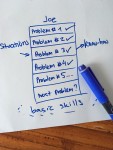What does it mean to develop someone?
The cornerstone idea of Lean thinking is that “to make quality products we first have to develop quality people.”
But what does it mean to “develop people”?
Our obsession bureaucratic conditioning tends to make us think in terms of Roles and Rules. A person is therefore seen as:
- the responsibilities that are (and are not) part of her job
- the procedures she masters (and executes faithfully) to realize these responsibilities
- the competences she needs to do so
This would work fine in a stable, unified, socialist world (whether in the Victorian nostalgia Mary Poppins sense, or the communist post-state sense) in which everyone is the same and nothing ever changes, but hardly true in fast changing, messy, creative liberal democracies.
In Lean thinking, someone is seen rather differently:
- the depth of their commitment to customer focus, teamwork and making work easier for their own staff
- the problems they know how to solve autonomously in various conditions
- the basic skills they master and their ability to reflect on the impact of these skills on the overall product
Which is rather different.

In practice, this means that instead of looking at someone’s development as a list of “know-how,” we look at the list of key problems they know how to solve autonomously: problems they understand in a wide variety of situations and they know how to solve with the right outcome – and without help.
Trouble is of course, if you ask them “how do you solve this problem” – they’ll tell you. And they’ll explain naturally to everyone else how to do so, and we’re back to a list of know-how. But if you ask them: “how do you solve this problem in this specific set of circumstances?” their answers will be far more interesting, and complex.

Contrarily to a list of fixed know-hows, autonomy in problem solving can’t be acquired many problems at a time. Development is proximal: having mastered one generic problem, the person is ready to tackle the next. Worse, having got the hang of problem doesn’t necessarily help you with a new, completely different one, as countermeasures could come from a very different direction.
Developing someone means helping them to learn how to solve generic problems in a variety of situations (more varied cases help to understand the problem more deeply), one by one.It also means they progressively develop better and better judgment about how their solutions improve the overall outcome rather than simply push on the problem onto someone else.
How do you know you’ve succeeded? When they, in turn, take it upon themselves to develop someone else.
2 Comments










Pingback: What does it mean to develop someone? - Lead Wi...
Pingback: essays on the help